Unit 5 Our school life Topic 1 I usually come to school by subwaySection B 授课课件
文档属性
| 名称 | Unit 5 Our school life Topic 1 I usually come to school by subwaySection B 授课课件 |  | |
| 格式 | pptx | ||
| 文件大小 | 35.1MB | ||
| 资源类型 | 试卷 | ||
| 版本资源 | 仁爱科普版 | ||
| 科目 | 英语 | ||
| 更新时间 | 2022-12-27 14:14:37 | ||
图片预览

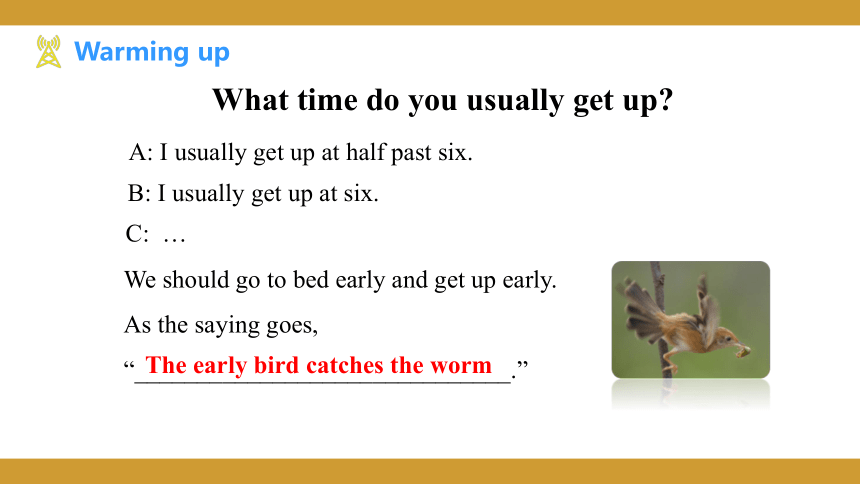

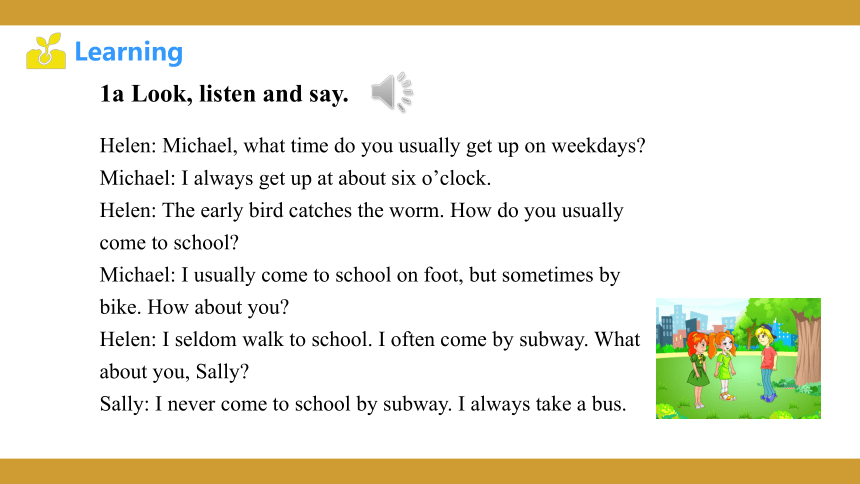

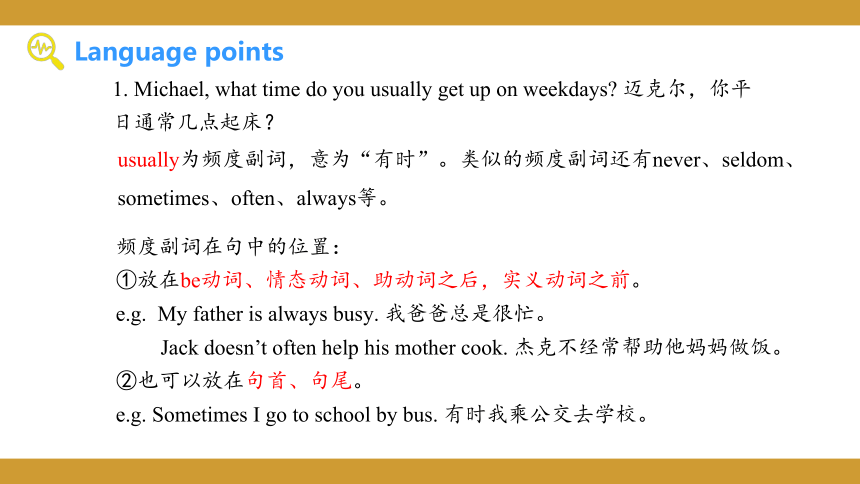
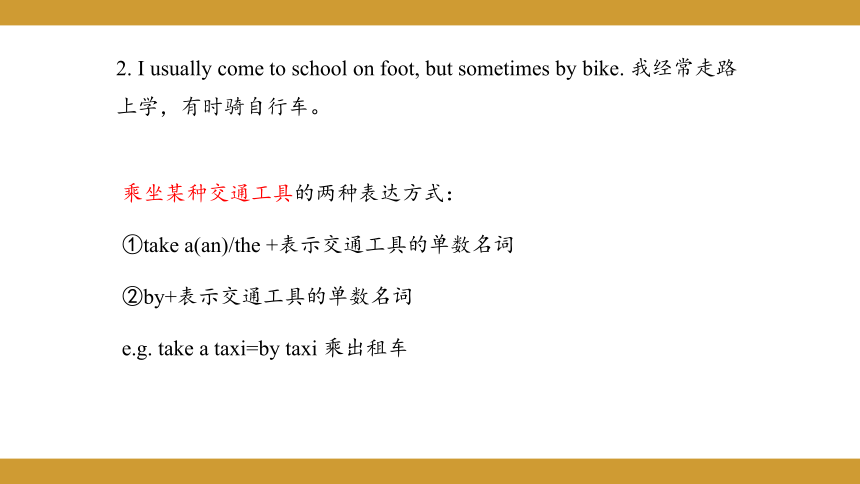
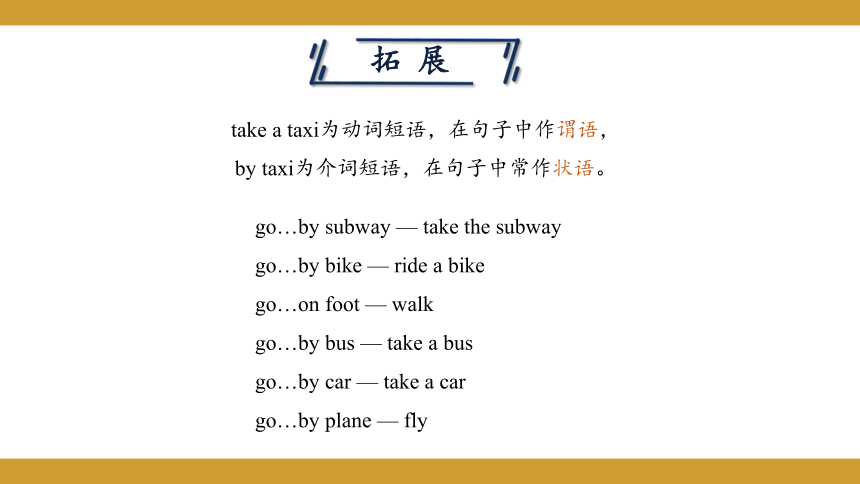
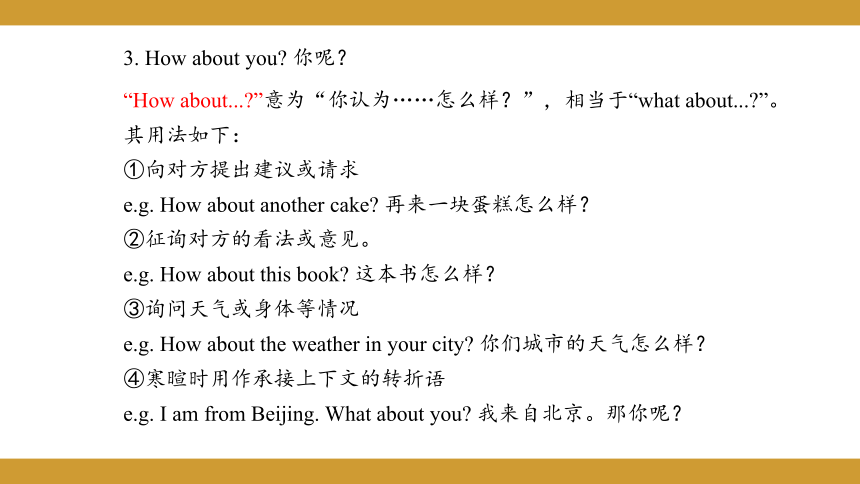
文档简介
(共22张PPT)
Section B
Unit 5 Our School Life
Topic 1 I usually come to school by subway.
We should go to bed early and get up early.
As the saying goes,
“______________________________.”
What time do you usually get up
A: I usually get up at half past six.
B: I usually get up at six.
C: …
The early bird catches the worm
Michael, Helen and Sally meet on the playground. What are they talking about Let’s listen and find out more.
“
“
Helen: Michael, what time do you usually get up on weekdays
Michael: I always get up at about six o’clock.
Helen: The early bird catches the worm. How do you usually come to school
Michael: I usually come to school on foot, but sometimes by bike. How about you
Helen: I seldom walk to school. I often come by subway. What about you, Sally
Sally: I never come to school by subway. I always take a bus.
1a Look, listen and say.
Enjoy the video
1. Michael, what time do you usually get up on weekdays 迈克尔,你平日通常几点起床?
usually为频度副词,意为“有时”。类似的频度副词还有never、seldom、sometimes、often、always等。
频度副词在句中的位置:
①放在be动词、情态动词、助动词之后,实义动词之前。
e.g. My father is always busy. 我爸爸总是很忙。
Jack doesn’t often help his mother cook. 杰克不经常帮助他妈妈做饭。
②也可以放在句首、句尾。
e.g. Sometimes I go to school by bus. 有时我乘公交去学校。
2. I usually come to school on foot, but sometimes by bike. 我经常走路上学,有时骑自行车。
乘坐某种交通工具的两种表达方式:
①take a(an)/the +表示交通工具的单数名词
②by+表示交通工具的单数名词
e.g. take a taxi=by taxi 乘出租车
拓 展
take a taxi为动词短语,在句子中作谓语,by taxi为介词短语,在句子中常作状语。
go…by subway — take the subway
go…by bike — ride a bike
go…on foot — walk
go…by bus — take a bus
go…by car — take a car
go…by plane — fly
3. How about you 你呢?
“How about... ”意为“你认为……怎么样?”,相当于“what about... ”。其用法如下:
①向对方提出建议或请求
e.g. How about another cake 再来一块蛋糕怎么样?
②征询对方的看法或意见。
e.g. How about this book 这本书怎么样?
③询问天气或身体等情况
e.g. How about the weather in your city 你们城市的天气怎么样?
④寒暄时用作承接上下文的转折语
e.g. I am from Beijing. What about you 我来自北京。那你呢?
1b Listen to 1a and complete the sentences with usually, always, often, sometimes, seldom, or never.
1. Michael ________ walks to school but __________ goes by bike.
2. Helen ________ goes to school on foot. She _________ takes the underground.
3. Sally ________ takes the underground. She ________ goes to school by bus.
usually
sometimes
never
often
seldom
always
0%
100%
never ______
seldom
sometimes ______
often
usually _______
always
1c Read 1a and fill in the blanks with the correct words from the list in 1b.
Example:
Li Xiang often comes to school by bike.
Li Xiang often rides a bike to school.
2a Study the example to understand the two ways of expressing the same meaning. Then fill in the blanks.
Maria sometimes _____ home ____ _______.
Maria sometimes takes the subway home.
1
goes
by subway
We usually go to the park on foot.
We usually ______ to the park.
2
walk
They always go to the zoo by bus.
They always _____ _____ _____ to the zoo.
3
take a bus
2b Ask and answer questions about the pictures in 2a with your partner.
Example:
A: How does Li Xiang go to school
B: He often goes to school by bike./ He often rides a bike to school.
3 Listen to the passage about Nancy’s activities and check (√) the correct answers.
√
√
√
√
√
√
4 Chant and then match the first four sentences with the pictures.
2
4
1
3
Words: weekday, early, bird, catch, seldom, walk,
never, ride, park, watch
Phrases: take a bus/car, do one’s homework,
watch TV, see a movie, play soccer
Sentences:
The early bird catches the worm.
I never come to school by subway.
一、根据汉语意思和句意写出单词
1. What do you usually do on ____________(平日)?
2. The early bird _________(捉住) the worm.
3. Mary often ____________(骑) her bike to school.
4. Jim often gets up _________(早地) to catch the bus.
5. I __________(很少) watch TV on weekdays.
weekdays
catches
rides
early
seldom
二、句型转换
1. He always goes to school by bike. (同义句转换)
2. Jane usually gets up at 6:00. (对画线部分提问)
3. My father always watches TV in the evening.(改为否定句)
4. Maria often does her homework at 7:00. (改为一般疑问句)
He always rides his bike to school.
What time does Jane usually get up
My father never watches TV in the evening.
Does Maria often do her homework at 7:00
Review the Adverbs of Frequency.
Practice the means of transportation in different expressions.
Preview Section C of Unit 5 Topic 1.
Finish exercises of Unit 5 Topic 1 Section B.
Section B
Unit 5 Our School Life
Topic 1 I usually come to school by subway.
We should go to bed early and get up early.
As the saying goes,
“______________________________.”
What time do you usually get up
A: I usually get up at half past six.
B: I usually get up at six.
C: …
The early bird catches the worm
Michael, Helen and Sally meet on the playground. What are they talking about Let’s listen and find out more.
“
“
Helen: Michael, what time do you usually get up on weekdays
Michael: I always get up at about six o’clock.
Helen: The early bird catches the worm. How do you usually come to school
Michael: I usually come to school on foot, but sometimes by bike. How about you
Helen: I seldom walk to school. I often come by subway. What about you, Sally
Sally: I never come to school by subway. I always take a bus.
1a Look, listen and say.
Enjoy the video
1. Michael, what time do you usually get up on weekdays 迈克尔,你平日通常几点起床?
usually为频度副词,意为“有时”。类似的频度副词还有never、seldom、sometimes、often、always等。
频度副词在句中的位置:
①放在be动词、情态动词、助动词之后,实义动词之前。
e.g. My father is always busy. 我爸爸总是很忙。
Jack doesn’t often help his mother cook. 杰克不经常帮助他妈妈做饭。
②也可以放在句首、句尾。
e.g. Sometimes I go to school by bus. 有时我乘公交去学校。
2. I usually come to school on foot, but sometimes by bike. 我经常走路上学,有时骑自行车。
乘坐某种交通工具的两种表达方式:
①take a(an)/the +表示交通工具的单数名词
②by+表示交通工具的单数名词
e.g. take a taxi=by taxi 乘出租车
拓 展
take a taxi为动词短语,在句子中作谓语,by taxi为介词短语,在句子中常作状语。
go…by subway — take the subway
go…by bike — ride a bike
go…on foot — walk
go…by bus — take a bus
go…by car — take a car
go…by plane — fly
3. How about you 你呢?
“How about... ”意为“你认为……怎么样?”,相当于“what about... ”。其用法如下:
①向对方提出建议或请求
e.g. How about another cake 再来一块蛋糕怎么样?
②征询对方的看法或意见。
e.g. How about this book 这本书怎么样?
③询问天气或身体等情况
e.g. How about the weather in your city 你们城市的天气怎么样?
④寒暄时用作承接上下文的转折语
e.g. I am from Beijing. What about you 我来自北京。那你呢?
1b Listen to 1a and complete the sentences with usually, always, often, sometimes, seldom, or never.
1. Michael ________ walks to school but __________ goes by bike.
2. Helen ________ goes to school on foot. She _________ takes the underground.
3. Sally ________ takes the underground. She ________ goes to school by bus.
usually
sometimes
never
often
seldom
always
0%
100%
never ______
seldom
sometimes ______
often
usually _______
always
1c Read 1a and fill in the blanks with the correct words from the list in 1b.
Example:
Li Xiang often comes to school by bike.
Li Xiang often rides a bike to school.
2a Study the example to understand the two ways of expressing the same meaning. Then fill in the blanks.
Maria sometimes _____ home ____ _______.
Maria sometimes takes the subway home.
1
goes
by subway
We usually go to the park on foot.
We usually ______ to the park.
2
walk
They always go to the zoo by bus.
They always _____ _____ _____ to the zoo.
3
take a bus
2b Ask and answer questions about the pictures in 2a with your partner.
Example:
A: How does Li Xiang go to school
B: He often goes to school by bike./ He often rides a bike to school.
3 Listen to the passage about Nancy’s activities and check (√) the correct answers.
√
√
√
√
√
√
4 Chant and then match the first four sentences with the pictures.
2
4
1
3
Words: weekday, early, bird, catch, seldom, walk,
never, ride, park, watch
Phrases: take a bus/car, do one’s homework,
watch TV, see a movie, play soccer
Sentences:
The early bird catches the worm.
I never come to school by subway.
一、根据汉语意思和句意写出单词
1. What do you usually do on ____________(平日)?
2. The early bird _________(捉住) the worm.
3. Mary often ____________(骑) her bike to school.
4. Jim often gets up _________(早地) to catch the bus.
5. I __________(很少) watch TV on weekdays.
weekdays
catches
rides
early
seldom
二、句型转换
1. He always goes to school by bike. (同义句转换)
2. Jane usually gets up at 6:00. (对画线部分提问)
3. My father always watches TV in the evening.(改为否定句)
4. Maria often does her homework at 7:00. (改为一般疑问句)
He always rides his bike to school.
What time does Jane usually get up
My father never watches TV in the evening.
Does Maria often do her homework at 7:00
Review the Adverbs of Frequency.
Practice the means of transportation in different expressions.
Preview Section C of Unit 5 Topic 1.
Finish exercises of Unit 5 Topic 1 Section B.
同课章节目录
- Unit 5 Our school life
- Topic 1 I usually come to school by subway.
- Topic 2 A few students are running around the play
- Topic 3 My school life is very interesting.
- Unit 6 Our local area
- Topic 1 Is there a computer in your study?
- Topic 2 My home is in an apartment building.
- Topic 3 Which is the way to the hospital?
- Review of Units 5-6
- Unit 7 The Birthday
- Topic 1 When is your birthday?
- Topic 2 Can you sing an English song?
- Topic 3 Everyone had a good time.
- Unit 8 The seasons and the Weathe
- Topic 1 What's the weather like in summer?
- Topic 2 The summer holidays are coming.
- Topic 3 Let’s celebrate!
- Review of Units 7-8
- 旧版资料
- Unit 5 Our School Life
- Unit 6 Our Local Area
- Unit 7 The Birthday
- Unit 8 The seasons and the Weathe
- Unit 7 Celebrating the Birthday(老版本)
